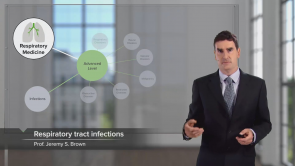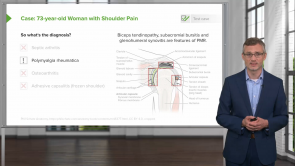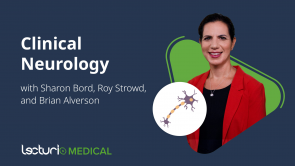Non-parkinsonian Movement Disorders: Tremors
Über den Vortrag
Der Vortrag „Non-parkinsonian Movement Disorders: Tremors“ von Roy Strowd, MD ist Bestandteil des Kurses „Non-parkinsonian Movement Disorders“.
Quiz zum Vortrag
What is a tremor?
- A rhythmic, involuntary oscillating movement of a body part
- An irregular, voluntary oscillating movement of a single hand
- An irregular, involuntary oscillating movement involving symmetric limbs
- An oscillating movement of any body part associated specifically with a metabolic disturbance
- Seizure-like activity
Which of the following is defined as a tremor seen while a limb is supported against gravity, paired with the disease it is usually associated with?
- Rest tremor; Parkinson disease
- Essential tremor; Lewy body dementia
- Holmes tremor; Alzheimer disease
- Intention tremor; alcoholism
Which of the following types of tremor might be classified as either a postural or a kinetic tremor?
- Essential tremor
- Physiologic tremor
- Rest tremor
- Orthostatic tremor
- Isometric tremor
What anatomic region of the brain might be affected in a patient who presents with an intention tremor?
- Cerebellum
- Brainstem
- Prefrontal cortex
- Arcuate gyrus
- Area postrema
Which condition is associated with fever, altered mental status, and physiologic tremor?
- Thyrotoxicosis
- Hyperglycemia
- Hypothyroidism
- Acute opioid intoxication
- Heart failure
What is a key distinguishing feature between essential tremor and the tremor of Parkinson disease?
- Parkinson disease displays a rest tremor, while essential tremor is usually kinetic/postural.
- The tremor of Parkinson disease often improves with alcohol use, while essential tremor does not.
- The tremor of Parkinson disease is usually associated with a positive family history, while essential tremor usually is not.
- Essential tremor is more often seen in older populations compared to the tremor of Parkinson disease.
What is the usual treatment for essential tremor?
- Propranolol
- Levodopa
- Venlafaxine
- Naltrexone
- Loratadine
What condition should you suspect in a patient who presents with a combination of rest, action, and postural tremors with a "wing-beating" pattern?
- Holmes tremor
- Normal pressure hydrocephalus
- Seizure disorder
- Multiple sclerosis
- Essential tremor
Kundenrezensionen
5,0 von 5 Sternen
| 5 Sterne |
|
5 |
| 4 Sterne |
|
0 |
| 3 Sterne |
|
0 |
| 2 Sterne |
|
0 |
| 1 Stern |
|
0 |






